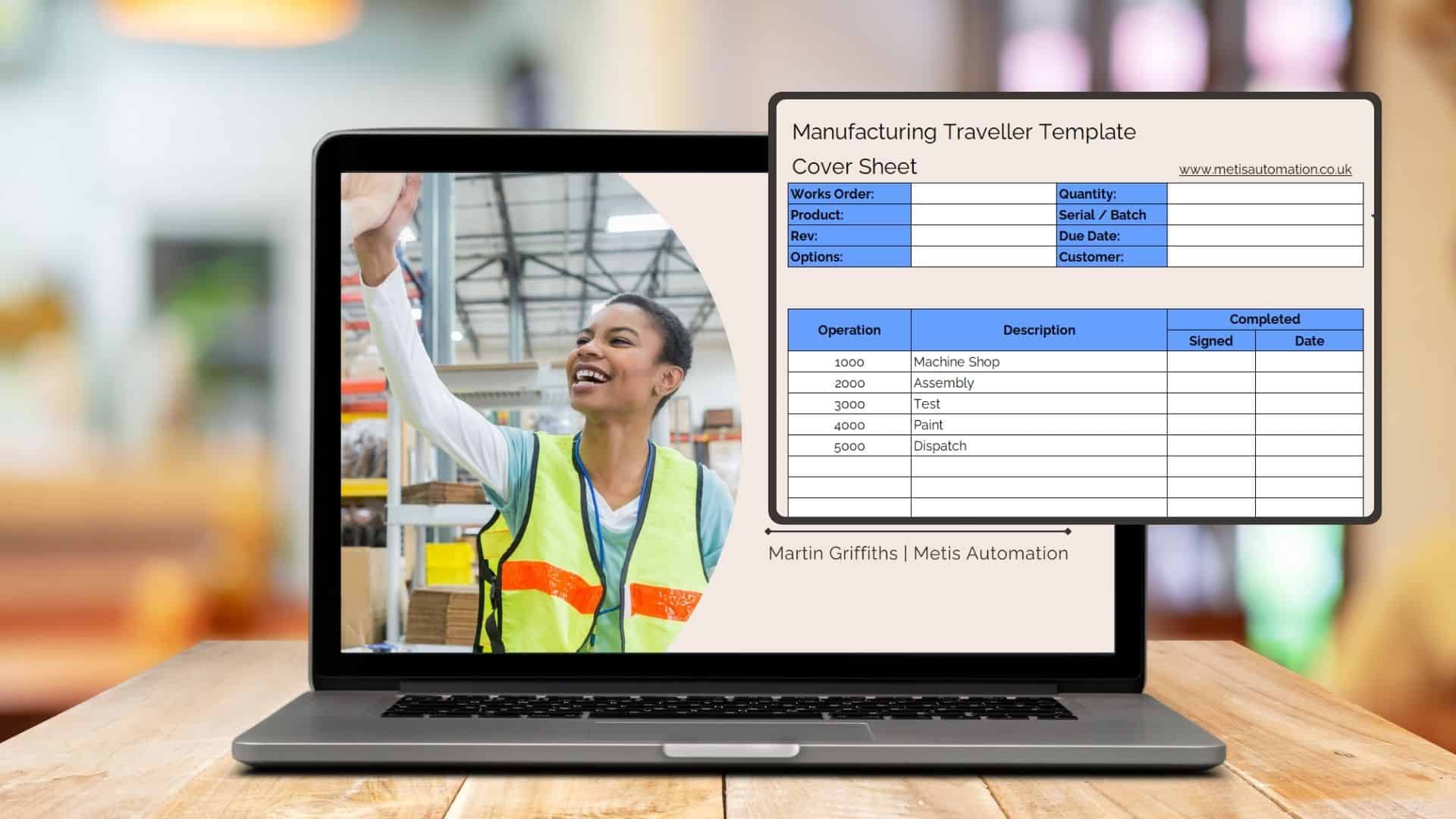Digital Transformation: Empowering Sustainable Manufacturing

Introduction
Sustainability has become a critical operational imperative. Businesses face pressure to boost efficiency, reduce costs, and act in an environmentally responsible manner. Challenges include waste management, energy reduction, carbon footprint minimization, and sustainable material sourcing. Digital transformation, integrating technologies like Manufacturing Execution Systems (MES), the Internet of Things (IoT), Artificial Intelligence (AI), and big data analytics, offers a pathway to enhance sustainability efforts and exceed environmental standards.
Let’s explore how the digital transformation journey can redefine sustainability in manufacturing, turning challenges into opportunities for innovation, growth, and a greener future.
Empower Sustainable Manufacturing:
Download our Free Digital Transformation Starter Kit. Implement expert strategies and clear guidance to elevate your manufacturing process, enhancing both sustainability and efficiency.
The Importance of Sustainability in Manufacturing
Sustainability is no longer optional; it’s a core component of modern manufacturing. It guides environmental responsibility and shapes the future of processes, products, and business strategies. Here’s why:
- Market Opportunities and Differentiation:
- Consumers and corporate purchasers increasingly consider carbon footprints when making buying decisions.
- Companies that offer low- or zero-carbon products have a competitive advantage in the market.
- Cost Savings and Efficiency:
- Sustainable practices lead to cost reductions by optimising resource use and improving energy efficiency.
- Manufacturers can streamline production processes, reduce waste, and operate more cost-effectively.
- Brand Reputation and Customer Loyalty:
- Brands that prioritise sustainability enhance their reputation and attract environmentally conscious consumers.
- Positive perception can lead to increased customer loyalty and market share.
- Environmental Impact and Responsibility:
- Manufacturers play a crucial role in mitigating climate change.
- By embracing sustainability, businesses actively contribute to preserving the planet for future generations.
Understanding Digital Transformation in Manufacturing
Digital Transformation’s have had a significant impact in manufacturing. It’s about moving beyond traditional practices to a future where data, connectivity, and automation drive efficiency, innovation, and sustainability.
What is Digital Transformation?
Digital transformation in manufacturing is the process of integrating digital technology into all areas of production, changing how you operate and deliver value to customers. It’s not just about upgrading old equipment with new; it’s about rethinking operations from the ground up. At its core, digital transformation uses the power of data and digital tools to make manufacturing smarter, more agile, and more sustainable.
Transform Your Manufacturing:
Download our free Digital Transformation Starter Kit. Learn how to use digital technology for smarter, more sustainable operations.
Key Technologies Powering the Transformation
Manufacturing Execution Systems (MES)
MES plays a pivotal role in digital transformation by providing a digital backbone for operations. These systems collect data from every corner of the manufacturing floor, offering real-time insights into production processes. This allows for precise control, monitoring, and optimization of manufacturing activities, from raw material intake to final product delivery.
The Internet of Things (IoT)
IoT technology connects machines, devices, and sensors, enabling them to communicate and share data. In manufacturing, this connectivity allows for unprecedented levels of automation and efficiency. IoT devices can monitor equipment health, predict maintenance needs, and even adjust operations in real-time to improve energy efficiency and reduce waste.
Artificial Intelligence (AI) and Machine Learning
AI and machine learning are at the forefront of transforming manufacturing operations. These technologies can analyse vast amounts of data to identify patterns, predict outcomes, and make decisions. From optimising supply chains to improving product quality and reducing downtime, AI offers significant advantages in making manufacturing processes smarter and more adaptable.
Big Data Analytics
Big data analytics refers to the ability to process and analyse large data sets to uncover hidden patterns, correlations, and insights. In the context of manufacturing, big data analytics can lead to breakthroughs in understanding customer behaviour, predicting market trends, and enhancing operational efficiency. It enables manufacturers to make informed decisions based on comprehensive data analysis, driving continuous improvement and innovation.
Summary
Digital transformation in manufacturing opens up a new world of possibilities, where technology not only streamlines production but also propels businesses towards a future of increased efficiency, product quality, and sustainability. Through embracing technologies like MES, IoT, AI, and big data analytics, manufacturers can navigate the complexities of modern production with greater agility and insight.
Implementing Digital Transformation for Sustainability
Embarking on a journey towards sustainability through digital transformation is a strategic move that can redefine manufacturing operations. Let’s break down the actionable steps manufacturers can take to start their digital transformation journey with a sustainability focus.
Starting Your Digital Transformation Journey:
1. Assess Your Current State
Begin by evaluating your current manufacturing processes and identifying areas where improvements can be made. This involves assessing energy consumption, waste production, resource usage, and supply chain practices. Understanding your starting point is crucial for setting realistic goals and measuring progress.
2. Define Your Sustainability Goals
Clear, achievable goals are the cornerstone of any successful transformation. Define what sustainability means for your business, whether it’s reducing carbon emissions, minimising waste, or achieving zero landfill status. Make these goals specific, measurable, and aligned with your overall business strategy.
3. Identify the Right Technologies
Research and identify the digital technologies that will most effectively help you achieve your sustainability goals. This could include real-time monitoring and process optimisation, IoT devices for energy management, AI and big data analytics for predictive maintenance and resource optimisation, or blockchain for supply chain transparency.
4. Develop a Roadmap
Create a detailed implementation roadmap that outlines the steps, timelines, and resources required to deploy these technologies. Consider starting with pilot projects in areas with the highest potential for impact. This phased approach allows for learning and adjustments before a full-scale rollout.
Start Your Sustainable Transformation:
Downloadour free Digital Transformation Starter Kit. Kickstart your journey with essential insights and tools to assess, plan, and implement digital strategies that enhance sustainability.
Challenges and Considerations
Digital transformation’s presents a set of unique challenges and considerations. Understanding these potential hurdles and preparing strategies to overcome them is crucial for a successful transition. Let’s explore some of these challenges and offer practical tips for navigating them.
1. Initial Costs and Investment
One of the primary concerns for manufacturers considering digital transformation is the upfront cost. Implementing new technologies, upgrading systems, and integrating sustainable practices often require a significant initial investment.
Tips for Overcoming Cost Challenges:
- Seek Government Grants and Incentives: Many governments offer financial support for businesses implementing sustainable technologies. Research available grants or tax incentives that can offset initial costs.
- Calculate Long-term Savings: While the upfront cost might be high, focusing on the long-term savings through energy efficiency, reduced waste, and operational improvements can justify the investment.
- Start Small: Implement changes incrementally. Starting with small, pilot projects can reduce initial expenses and allow you to demonstrate ROI before committing to larger investments.
2. Training Needs and Skill Gaps
Digital transformation necessitates a workforce that is skilled in new technologies. The existing skill gap in the manufacturing sector can make it challenging to implement and optimise digital solutions effectively.
Tips for Bridging the Skill Gap:
- Invest in Training and Development: Dedicate resources to upskill your workforce. Providing training in new technologies and sustainable practices will empower your employees and facilitate a smoother transition.
- Partner with Educational Institutions: Collaborate with universities, colleges, and technical schools to develop tailored training programs that meet your specific needs.
- Hire New Talent: Consider bringing in new talent with the required digital skills and sustainability knowledge to complement your existing workforce.
Cultural Resistance to Change
Change can often be met with resistance, especially when it requires a shift in longstanding practices and mindsets. Cultivating a culture that embraces digital transformation and sustainability is essential.
Tips for Managing Cultural Change:
- Communicate the Vision: Clearly articulate the benefits of digital transformation for sustainability, not just for the business but for the environment and society at large. Ensuring everyone understands the ‘why’ behind the change can foster greater acceptance and support.
- Involve Employees in the Process: Give your team a voice in the transformation process. Involvement in decision-making can increase buy-in and reduce resistance.
- Celebrate Successes: Acknowledge and celebrate milestones and successes, however small, to build momentum and reinforce the positive impact of the changes.
Conclusion
In conclusion, the integration of digital transformation and sustainability in manufacturing is a pragmatic response to modern operational needs. Sustainability is now a non-negotiable aspect of manufacturing, driven by market demands, cost efficiencies, brand reputation, and environmental responsibility. Digital transformation, powered by technologies like MES, IoT, AI, and big data analytics, offers a practical pathway to achieve these sustainability objectives.
By leveraging digital technologies, manufacturers can optimize operations, reduce waste, enhance energy efficiency, and make data-informed decisions. This not only boosts competitiveness but also positions companies as leaders in responsible production practices.
However, implementing digital transformation for sustainability comes with challenges, including initial investment costs, skill gaps, and cultural resistance to change. Yet, with careful planning, strategic investment, and a commitment to fostering an innovative culture, these challenges can be overcome.
The journey towards sustainable manufacturing through digital transformation is about continuous improvement and innovation. By setting clear goals, embracing emerging technologies, and taking proactive steps, manufacturers can meet present demands while creating a greener, more sustainable future.
Let’s Talk Tascus
Want to see how Tascus can cut errors,
speed up production, and simplify
compliance in your factory?





